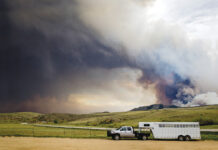- Regularly tighten electric tape fence; check tension on polymer rail fencing.
- Control weeds in pastures.
- Re-nail loose boards on wood fences.
- Fertilize pastures at least twice per year.
- Fill low pasture spots with dirt and re-seed.
- Spread manure in empty pastures with a harrow (drag) or manure spreader.
- Mow beneath electric fence (or fence running a hot wire) and control weeds to prevent line shortage.
- Mow uneven pasture areas to a uniform height.
- Rotate grazing to keep pastures healthy.
- Walk your pastures looking for hazards, such as rocks, loose fence boards, popped nails, low tree branches or gopher holes. Check for electric shortages.
- Create a mud lot, or sacrifice area, to protect pastures in inclement weather.
- Keep horses off frozen pasture to prevent root damage to the grass.
- Treat wood stall areas with anti-chewing paints that are safe for use around horses, or cover chewable areas with heavy wire mesh.
- Fortify ground around waterers/troughs with extra gravel or material that compacts well.
- Nail heavy wire mesh over glass windows to protect “nosey” horses.
- Maintain level stall floors by filling low spots with dirt, clay or limestone.
- Grease chains on equipment.
- Change oil in tractors according to manufacturer warranties; replace air filters frequently to combat excess farm dust and debris.
- Drag arena footing before every ride to maintain uniform depth.
- Apply White Lithium Grease, a multipurpose lubricant, to the horizontal bolt on stall door handles and sliding-door tracks to reduce friction and wear.
- When temperatures are below freezing, you should apply heat tape to all exterior water supply piping and shutoff valves. The heat tape must plug directly into a Ground Fault Circuit Interrupter (GFCI) receptacle.
- Clean cobwebs from barn ceilings to minimize fire hazards.
- Clean water troughs frequently (sometimes weekly in hot weather), to prevent buildup of certain types of toxic algae, as well as eliminating a breeding ground for mosquitoes.
- Sweep debris from barn aisles daily to reduce dust and pests.
- Check and replace feed containers to ensure that no rodents can get in.
- Do a plumbing check on property, looking for leaky faucets, pipes and hoses. Replace brittle hoses.
- Inspect barn electrical wiring for rodent damage or aging system. Upgrade to GFCI outlets.
- Prep your pathways for the rainy season by leveling then adding gravel or other well-draining material.
- Haul or throw away any broken, outdated or unused equipment that clutters your barn or tack room.
- Buy one of those plastic owls that is supposed to scare away birds. Write to us if it actually does.







Great tips!